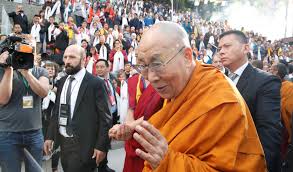The congressional delegation visited the Tibetan spiritual leader, who resides in exile in India, at a time when President Joe Biden is set to sign a bill increasing pressure on China to address tensions with Tibet.
A contingent of United States legislators convened with the Dalai Lama, the spiritual leader of Tibet, in India on Wednesday, a move anticipated to provoke China. This visit coincided with President Joe Biden’s imminent signing of a bill designed to compel Beijing to address tensions in Tibet and safeguard the region’s indigenous Buddhist culture. The bipartisan group of seven lawmakers, led by Rep. Michael McCaul (R-Texas) and featuring former House Speaker Nancy Pelosi (D-Calif.), arrived in Dharamshala, a Himalayan town in northern India where the 88-year-old Dalai Lama has resided since fleeing China following a failed Tibetan uprising against Chinese authority in 1959.
McCaul expressed his aspirations following the meeting, stating, “It is still my hope that one day the Dalai Lama and his people will return to Tibet in peace,” as reported by Reuters.
On Tuesday, McCaul disclosed that Biden is set to endorse a bill recently passed by Congress urging Beijing to restart negotiations with the Dalai Lama and other Tibetan leaders, conversations that have been dormant since 2010. The bill also calls for addressing Tibetan concerns regarding cultural, religious, and linguistic autonomy.
Pelosi emphasized the bill’s message to the Chinese government, stating, “This bill says to the Chinese government: things have changed now, get ready for that,” Reuters reported. Pelosi’s visit to Taiwan in 2022 had earlier prompted China to conduct live-fire military exercises around the island after her departure.
The lawmakers’ audience with the Dalai Lama is likely to agitate Beijing at a time when the U.S. and China are endeavoring to mend relations. Beijing regards the 1989 Nobel Peace laureate as an anti-China “separatist,” a claim he refutes, and opposes any foreign official engagement with him.
The Chinese Foreign Ministry, on Tuesday, reiterated that Tibet-related matters are internal to China and affirmed China’s commitment to defend its sovereignty, security, and developmental interests. Spokesperson Lin Jian emphasized, “We urge the U.S. side to adhere to its commitments of recognizing Tibet as part of China and not supporting ‘Tibet independence.'”
The Dalai Lama is scheduled to travel to the United States for medical treatment this month, though it remains unclear if he will meet with any U.S. officials during his visit.
Since George H.W. Bush’s presidency, every sitting U.S. president had met with the Dalai Lama until Donald Trump’s tenure. Biden, who criticized Trump during his 2020 campaign for not meeting with the Tibetan spiritual leader, has not done so since taking office in 2021.
Brahma Chellaney, a professor emeritus at the Center for Policy Research in New Delhi, commented that the lawmakers’ meeting with the Dalai Lama aims to compensate for what he perceives as the Biden administration’s reluctance to address Tibet more assertively. He emphasized the need for collaboration between the U.S. and India to counter China’s misinformation concerning Tibet and to thwart China’s efforts to influence the selection of the next Dalai Lama.
Like the U.S., India officially recognizes Tibet as part of China, despite hosting Tibetan exiles.
McCaul asserted on Wednesday that the U.S. would not permit China to interfere in the process of selecting the Dalai Lama’s successor, traditionally believed to be the reincarnation of the Buddha upon his death.
A contentious issue surrounds the Panchen Lama, the second-most prominent figure in Tibetan Buddhism, after the Dalai Lama. In 1995, the officially atheist Chinese government identified two different individuals as reincarnations, leading to a dispute over who is the rightful Panchen Lama. Activists claim that the Dalai Lama’s chosen successor, a six-year-old child, was seized by the Chinese government shortly after his identification and has since been forcibly detained.
China asserts that Tibet has flourished and modernized under Communist Party rule, citing developments such as highways, high-speed railways, infrastructure improvements, and the promotion of tourism. Critics argue that these advancements have occurred at the expense of Tibetan cultural, linguistic, and religious traditions as Beijing continues its policy of “Sinicization” in the remote and mountainous region, which it annexed in the 1950s.
Tenpa Tsering, president of the Tibetan government-in-exile, condemned the Chinese Communist Party’s actions, stating, “Such infliction of suffering and oppression on the Tibetan people by the Chinese Communist Party authorities is unparalleled and unprecedented,” in remarks made last year.

